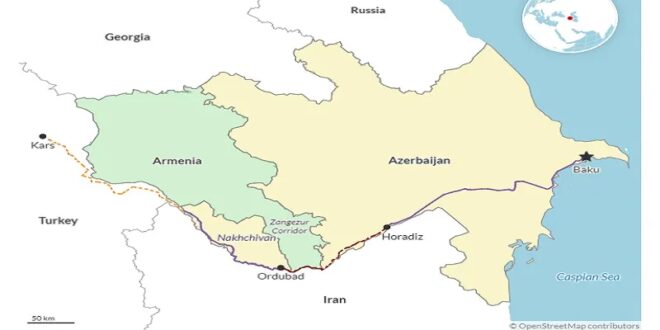This is no longer a small matter after the Iranian Foreign Ministry summoned the Russian Ambassador to share their concerns with him about his country’s support of this project.
Iran’s continued opposition to the Zangezur Corridor was touched upon here last month, where it was concluded that it’s relying on false pretexts to advance what it regards as its national interests. Since then, the Iranian Foreign Minister implied that the project would redraw regional borders, after which his institution summoned the Russian Ambassador to share their concerns given Moscow’s support of it. Here are five observations about this policy’s motivations and consequences:
- Iran Has No Right To Interfere With This Issue…
What Azerbaijan calls the Zangezur Corridor was agreed to by it, Armenia, and Russia in the Moscow-mediated November 2020 ceasefire’s last clause. It’s a purely economic project which’ll be defended by the FSB’s Border Guards Service, not a territorially revisionist one that’ll threaten Iranian interests. Tehran therefore has no right to interfere with this issue, but its efforts appear to be at least partially motivated by wanting to host an alternative corridor via Northern Iran if Zangezur isn’t implemented.
- …But It Might Be Driven By Its Competition With The West In Armenia…
From Iran’s perspective, hyping up non-existent territorial threats from Azerbaijan might make the ruling Armenian clique consider their country to be a more reliable security partner than the West, which it’s been pivoting to since the abovementioned ceasefire and with extra gusto over the past year. This could possibly decelerate the aforesaid trend, which Russia might appreciate with time if that happens, but at the cost of further complicating Iran’s already complex relations with Azerbaijan.
- …Or Mistaken Perceptions Of A Quid Pro Quo With Russia
Another explanation is that Iran mistakenly assumed that Russia would quietly back off from its support of the Zangezur Corridor in exchange for Iran reportedly supplying more missiles and drones to Russia. Whatever military-technical agreements they may have might not have included such terms, however, with this possibly just being wishful thinking on Tehran’s part. In any case, the fact that the Russian Ambassador was summoned over this issue shows that Iran is very upset, so this is no trivial matter.
- Russia’s Southern-Directed Pipeline Plans Might Be Endangered As A Result…
It was analyzed here late last month how Russia might be preparing to redirect its pipeline focus from the East (China) to the South (Azerbaijan, Iran, and India), but this would require resolving the Azerbaijani-Iranian security dilemma in order for Baku to then play the transit state in this arrangement. Azerbaijan might make its support contingent on Iran dropping its opposition to the Zangezur Corridor, while Iran might make its own support contingent on Azerbaijan dropping the Zangezur Corridor entirely.
- …And Turkish-Iranian Ties Could Also Be Damaged Too
Finally, Turkiye envisages the Zangezur Corridor facilitating its trade with Central Asia and China more than the Baku-Tbilisi-Kars railway does, so it doesn’t appreciate Iran’s interference. Ties between them have always been complicated but still manageable, yet they could be damaged if this dispute drags on since Turkiye might consider Iran’s stance to be aimed at economically containing it. If bilateral trust deteriorates far enough, then Turkiye might enter into a rapprochement with the West to contain Iran.
The dynamics of this dispute suggest that no breakthrough is likely anytime soon, not just in terms of implementing the Zangezur Corridor, but even regarding Iran’s public opposition to it. Iran now perceives Russia as taking Azerbaijan’s side at its expense, but Moscow won’t drop its support for the project since Putin himself ensured that it was included in the Moscow-mediated November 2020 ceasefire. Hopefully this dispute doesn’t spiral out of control and harm cooperation on the North-South Transport Corridor.
 Eurasia Press & News
Eurasia Press & News



